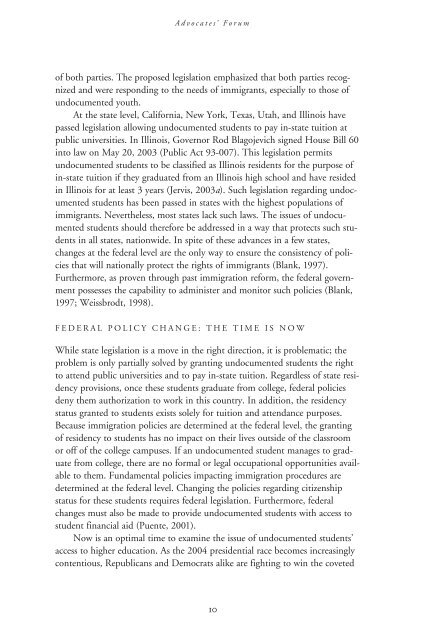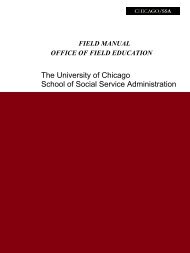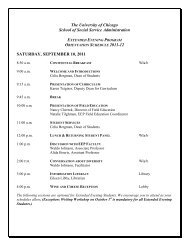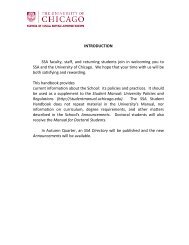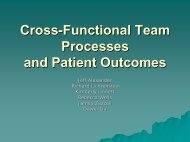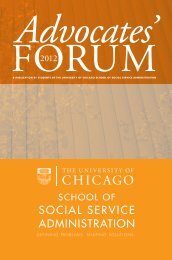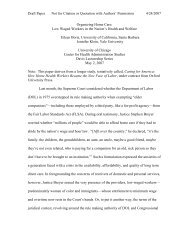2004 - School of Social Service Administration - University of Chicago
2004 - School of Social Service Administration - University of Chicago
2004 - School of Social Service Administration - University of Chicago
You also want an ePaper? Increase the reach of your titles
YUMPU automatically turns print PDFs into web optimized ePapers that Google loves.
Advocates’ Forum<br />
<strong>of</strong> both parties. The proposed legislation emphasized that both parties recognized<br />
and were responding to the needs <strong>of</strong> immigrants, especially to those <strong>of</strong><br />
undocumented youth.<br />
At the state level, California, New York, Texas, Utah, and Illinois have<br />
passed legislation allowing undocumented students to pay in-state tuition at<br />
public universities. In Illinois, Governor Rod Blagojevich signed House Bill 60<br />
into law on May 20, 2003 (Public Act 93-007). This legislation permits<br />
undocumented students to be classified as Illinois residents for the purpose <strong>of</strong><br />
in-state tuition if they graduated from an Illinois high school and have resided<br />
in Illinois for at least 3 years (Jervis, 2003a). Such legislation regarding undocumented<br />
students has been passed in states with the highest populations <strong>of</strong><br />
immigrants. Nevertheless, most states lack such laws. The issues <strong>of</strong> undocumented<br />
students should therefore be addressed in a way that protects such students<br />
in all states, nationwide. In spite <strong>of</strong> these advances in a few states,<br />
changes at the federal level are the only way to ensure the consistency <strong>of</strong> policies<br />
that will nationally protect the rights <strong>of</strong> immigrants (Blank, 1997).<br />
Furthermore, as proven through past immigration reform, the federal government<br />
possesses the capability to administer and monitor such policies (Blank,<br />
1997; Weissbrodt, 1998).<br />
FEDERAL POLICY CHANGE: THE TIME IS NOW<br />
While state legislation is a move in the right direction, it is problematic; the<br />
problem is only partially solved by granting undocumented students the right<br />
to attend public universities and to pay in-state tuition. Regardless <strong>of</strong> state residency<br />
provisions, once these students graduate from college, federal policies<br />
deny them authorization to work in this country. In addition, the residency<br />
status granted to students exists solely for tuition and attendance purposes.<br />
Because immigration policies are determined at the federal level, the granting<br />
<strong>of</strong> residency to students has no impact on their lives outside <strong>of</strong> the classroom<br />
or <strong>of</strong>f <strong>of</strong> the college campuses. If an undocumented student manages to graduate<br />
from college, there are no formal or legal occupational opportunities available<br />
to them. Fundamental policies impacting immigration procedures are<br />
determined at the federal level. Changing the policies regarding citizenship<br />
status for these students requires federal legislation. Furthermore, federal<br />
changes must also be made to provide undocumented students with access to<br />
student financial aid (Puente, 2001).<br />
Now is an optimal time to examine the issue <strong>of</strong> undocumented students’<br />
access to higher education. As the <strong>2004</strong> presidential race becomes increasingly<br />
contentious, Republicans and Democrats alike are fighting to win the coveted<br />
10


